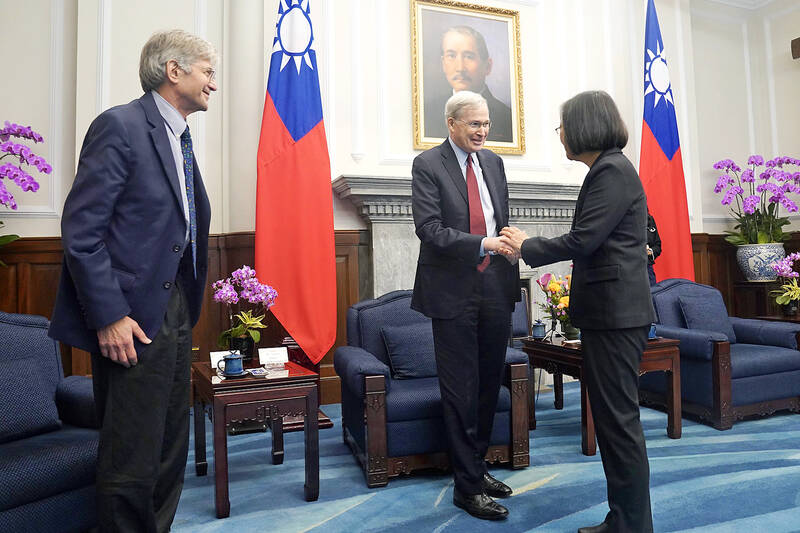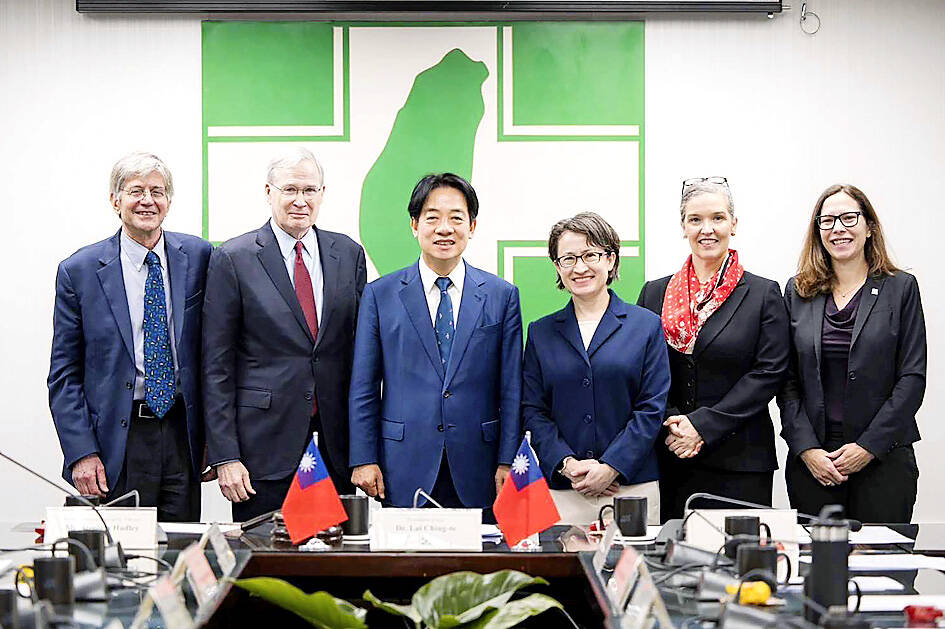Visiting former US officials yesterday reaffirmed the US’ rock-solid commitment to Taiwan, saying that the US is to keep working with Taiwan for peace and stability across the Taiwan Strait.
Former US national security adviser Stephen Hadley made the remarks during a meeting with President Tsai Ing-wen (蔡英文) at the Presidential Office in Taipei.
Hadley and former US deputy secretary of state James Steinberg arrived in Taiwan on Sunday for a post-election visit in a private capacity, the American Institute in Taiwan said.

Photo: CNA
Hadley conveyed congratulations to Tsai and Taiwanese on the smooth completion of the nation’s presidential and legislative elections on Saturday.
Taiwan’s democracy has set a shining example for the world and is a democratic success story based on transparency, rule of law, respect for human rights and freedom, he said.
The US’ commitment to Taiwan is rock-solid, principled and bipartisan, he said, adding that “the US would stand with its friend.”

Photo: Democratic Progressive Party via AP
Hadley said that he looked forward to seeing Taiwan and the US continue to deepen their relations to jointly safeguard peace and stability in the Taiwan Strait under the new government.
Steinberg said that Tsai’s leadership in the past eight years has been admirable, as it has benefited Taiwanese, significantly advanced the partnership between Taiwan and the US, and contributed to regional peace and stability.
The US’ Taiwan policy has remained consistent for a long time, supporting the informal but friendly relations between the two sides, he said.
The US maintains that cross-strait issues should be resolved through peaceful means and that any unilateral change to the “status quo” should be avoided, he said, adding that the approach is in the interest of all regional parties.
Tsai thanked the delegation for demonstrating the US’ support for Taiwan’s democracy through their visit, adding that she hoped to see Taiwan-US relations continue to deepen and become an important driving force for regional and global prosperity and development.
The delegation later yesterday met with president-elect William Lai (賴清德) and vice president-elect Hsiao Bi-khim (蕭美琴) at Democratic Progressive Party headquarters in Taipei.
Lai said that “democracy and freedom are the most valuable assets of the Taiwanese people,” as well as core values shared by Taiwan and the US, and the foundation of the stable relations between the two sides.
Sending congratulatory messages to him and Hsiao right after the elections on Saturday and a delegation of senior US representatives to Taiwan is “hugely meaningful” to the nation, as it shows firm support for Taiwan’s democracy and demonstrates close Taiwan-US ties, Lai said.
He vowed to lead Taiwan on the foundations laid by Tsai, safeguarding peace and stability in the Taiwan Strait.
Leading up to the inauguration ceremony in May, the government would continue to provide a solid foundation for the new government to take over seamlessly, he said.
Meanwhile, Japanese Chief Cabinet Secretary Yoshimasa Hayashi yesterday said that Taiwan is an important friend of Japan and vowed to deepen Japan-Taiwan ties.
“Taiwan is an extremely important partner and dear friend of our country, with whom we share fundamental values and have close economic ties and people-to-people exchanges,” Hayashi told a news conference.
Japan is to maintain its “working relationship on a non-governmental basis” with Taiwan while striving to further deepen cooperation and exchanges between the two sides, he said.
The Japanese government has long maintained that cross-strait disputes should be resolved through dialogue and peaceful means, and calls for regional peace and stability, he added.

NO-LIMITS PARTNERSHIP: ‘The bottom line’ is that if the US were to have a conflict with China or Russia it would likely open up a second front with the other, a US senator said Beijing and Moscow could cooperate in a conflict over Taiwan, the top US intelligence chief told the US Senate this week. “We see China and Russia, for the first time, exercising together in relation to Taiwan and recognizing that this is a place where China definitely wants Russia to be working with them, and we see no reason why they wouldn’t,” US Director of National Intelligence Avril Haines told a US Senate Committee on Armed Services hearing on Thursday. US Senator Mike Rounds asked Haines about such a potential scenario. He also asked US Defense Intelligence Agency Director Lieutenant General Jeffrey Kruse

INSPIRING: Taiwan has been a model in the Asia-Pacific region with its democratic transition, free and fair elections and open society, the vice president-elect said Taiwan can play a leadership role in the Asia-Pacific region, vice president-elect Hsiao Bi-khim (蕭美琴) told a forum in Taipei yesterday, highlighting the nation’s resilience in the face of geopolitical challenges. “Not only can Taiwan help, but Taiwan can lead ... not only can Taiwan play a leadership role, but Taiwan’s leadership is important to the world,” Hsiao told the annual forum hosted by the Center for Asia-Pacific Resilience and Innovation think tank. Hsiao thanked Taiwan’s international friends for their long-term support, citing the example of US President Joe Biden last month signing into law a bill to provide aid to Taiwan,

China’s intrusive and territorial claims in the Indo-Pacific region are “illegal, coercive, aggressive and deceptive,” new US Indo-Pacific Commander Admiral Samuel Paparo said on Friday, adding that he would continue working with allies and partners to keep the area free and open. Paparo made the remarks at a change-of-command ceremony at Joint Base Pearl Harbor-Hickam in Hawaii, where he took over the command from Admiral John Aquilino. “Our world faces a complex problem set in the troubling actions of the People’s Republic of China [PRC] and its rapid buildup of forces. We must be ready to answer the PRC’s increasingly intrusive and

STATE OF THE NATION: The legislature should invite the president to deliver an address every year, the TPP said, adding that Lai should also have to answer legislators’ questions The Chinese Nationalist Party (KMT) yesterday proposed inviting president-elect William Lai (賴清德) to make a historic first state of the nation address at the legislature following his inauguration on May 20. Lai is expected to face many domestic and international challenges, and should clarify his intended policies with the public’s representatives, KMT caucus secretary-general Hung Meng-kai (洪孟楷) said when making the proposal at a meeting of the legislature’s Procedure Committee. The committee voted to add the item to the agenda for Friday, along with another similar proposal put forward by the Taiwan People’s Party (TPP). The invitation is in line with Article 15-2